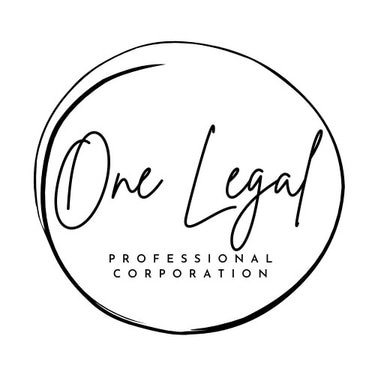Who Gets the Canada Child Benefit (CCB) After Separation? Here's What You Need to Know
OneLegal Professional Corporation
7/22/20252 min read


Who Gets the Canada Child Benefit (CCB) After Separation? Here's What You Need to Know.
By OneLegal Professional Corporation
Separation and divorce can be challenging—especially when children are involved. One of the most frequently asked questions we hear at OneLegal Professional Corporation is: “Who is eligible to receive the Canada Child Benefit (CCB) after separation?”
If you’re a parent navigating the end of a relationship, understanding how the Canada Revenue Agency (CRA)handles CCB payments in shared or sole parenting situations is crucial—not only for your financial planning but also to avoid unnecessary disputes or repayment demands.
In this blog, we break down CCB eligibility, how it works in shared parenting arrangements, and what the CRA’s alternating payment policy means for your family.
What Is the Canada Child Benefit (CCB)?
The Canada Child Benefit is a tax-free monthly payment from the CRA that helps eligible families with the cost of raising children under 18. The benefit is based on your income and caregiving responsibilities.
Who Is Eligible for the CCB?
To qualify for the CCB, a parent must meet several legal requirements:
Reside with the child on a regular basis.
Be primarily responsible for the child's care and upbringing.
Be a Canadian citizen, permanent resident, protected person, temporary resident (who has lived in Canada for the previous 18 months), or someone registered under the Indian Act.
The CRA defines “primary responsibility” as providing the child’s habitual and usual home, as well as making day-to-day decisions about their well-being.
✅ Legal Reference: Yao v. Canada, [2024] T.C.J. No. 17.
What Happens in Shared Parenting Arrangements?
In shared parenting situations, both parents may be eligible for the CCB, but only if the child lives with each parent on a near-equal basis—for example, alternating weeks or similar schedules.
In these cases:
Both parents are recognized as “shared-parenting parents.”
The CCB is divided equally, with each parent receiving 50% of the monthly payment.
The courts have consistently supported this approach in cases like Lavrinenko v. Canada, [2020] 1 F.C.R. 391 and Wachal v. Canada, [2020] T.C.J. No. 60.
The CRA’s Alternating Payment Policy
Even in shared parenting arrangements, not all families alternate weeks perfectly. To accommodate these realities, the CRA has introduced a shared eligibility policy that allows CCB payments to alternate every six months between parents—ensuring fairness over time.
This policy also applies to the GST/HST child benefit component.
✅ Legal Reference: White v. Canada, [2010] T.C.J. No. 311.
How Is CCB Eligibility Determined?
The CRA doesn't simply go by what’s written in a separation agreement—it assesses the real-life caregiving situation. This means:
Where the child actually lives matters more than what's on paper.
Who is actively involved in daily care decisions is key.
Parents must accurately report their parenting arrangement to the CRA to avoid future audits or overpayment demands.
Key Takeaways for Separated Parents
Primary Parenting: The parent with whom the child primarily resides receives 100% of the CCB.
Shared Parenting: If the child lives with both parents close to equally, the CCB is divided 50/50.
CRA Review: Be honest and transparent—false claims can lead to penalties or repayment obligations.
Six-Month Alternation: In shared parenting, CRA may alternate payments every six months to each parent.
Need Help Navigating CCB or Shared Parenting Issues?
At OneLegal Professional Corporation, we help families across Ontario navigate the complexities of post-separation parenting, including tax benefits, parenting plans, and child support arrangements.
If you're unsure about your eligibility or want to ensure your parenting agreement complies with CRA requirements, we’re here to help.
📞 Contact us today for a free 30-minute consultation and let’s make sure your child’s best interests—and your rights—are fully protected.
Let's Connect!
Contact US
info@onelegal.ca
Tel: (416) 380-7501
Fax: (416) 642-9457
The Information on this website is for informational purposes, and should not be construed as legal advice. If you require specific legal advice regarding your family law matter, please contact us to schedule a consultation
Copyright © 2025 OneLegal Professional Corporation
